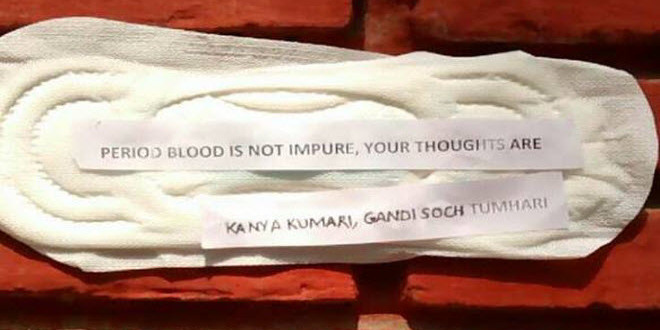In Defence Of PadsAgainstSexism At Jamia Millia Islamia
Pads Against Sexism

“Obscenity is a moral concept in the verbal arsenal of the Establishment, which abuses the term by applying it, not to expressions of its own morality but to those of another. Obscene is not the picture of a naked woman who exposes her pubic hair but that of a fully clad general who exposes his medals rewarded in a war of aggression; obscene is not the ritual of the Hippies but the declaration of a high dignitary of the Church that war is necessary for peace. Linguistic therapy — that is, the effort to free words ( and thereby concepts) from the all but total distortion of their meanings by the Establishment — demands the transfer of moral standards ( and of their validation) from the Establishment to the revolt against it.”
-Herbert Marcuse, An Essay on Liberation.
PadsAgainstSexism campaign, which initially started in Germany this month, went viral across the globe. Four undergraduate students of Jamia Millia Islamia University in New-Delhi initiated a similar campaign in their university in order to take on sexism. On 12 March they put up unused sanitary pads across the university campus with a message countering sexism written on it. However, the university administration was quick enough in getting all those sanitary-pads removed as quickly as possible.
The campaign swiftly spawned an atmosphere of awe, anguish and resentment among those associated with the university. For few days they remained anonymous but did come out with a press release making their stand clear later.
The success of this campaign is well attested by the huge uproar it created among faculties, students and a section of alumni’s. It successfully battled sexism on both- individual and institutional level. Firstly, the way people are threatening, hurling abuses and running a slanderous campaign on social media against those who initiated this campaign bear witness to the fact that it did bring few, if not many, uncomfortable questions into the public sphere. Such reactionary acts don’t come as surprise rather indicates that the campaign has challenged the widely held chauvinist beliefs, which deprives a woman of her agency.
Secondly, the administrations quick clamp-down on the sanitary-pads with a message on them and its pulling down was naked display of embedded institutional sexism. The messages written on sanitary-pads raised some very pertinent questions, intending to counter the widespread notions, about such as dressing ways of women ushering to rape, the taboo around menstrual blood, eve-teasing, lack of safety in public spaces etc. Unsurprisingly, this campaign seems to have annoyed a good chunk of people but what one needs to ask is that can we really afford to defy being perturbed by demand of gender-equity in our society, which this campaign beautifully put forwards.
Politics of majoritarianism feeds itself by deliberate construction of the other and more often than not, it brutally reduces a diverse community into a monolith entity. I hope we all would concede to the fact that we are faced with brutal onslaught of majoritarianism coupled with neo-liberalism in our country. Can we afford to deny that amidst troubled times this campaign runs contrary to the portrayal of Jamia by certain political groups, obviously on to the right of political spectrum, as an island of conservative Muslims?
Most importantly, university spaces are avenues for critical reflection and the very raison d’être of a university is to inculcate the art of reasoning among its pupils. Such a space should always be open to different opinions. One reserve all right to not necessarily agree with what is being said or done but not agreeing shall never mean further coercion or imposition of one’s views on others. It’s quite disheartening to see fellow students issuing threats, being abusive and passing personal comments on those four students who initiated this campaign. It is an obligation to extend solidarity and stand with Mejaz, Mohit, Kaainat and Sameera.
The anguish of a section of students, who are sadly dependent on external agency such as social media to express their disagreement from the campaign, is inadvertently signifying that much of this stems out from the lack of democratic space to students on the campus. The administration has repeatedly been in denial of democratic space to its own students. Past experiences are exemplary of how it has dealt with its own students who attempted to reclaim the democratic space. Without a democratic space the chances of debate, discussion and dissent among student fraternity are bleak. So it is more likely that instead of providing opportunities for critical reflection and nurturing the ability of its pupils to question the ills in society the university would end up reinforcing it.
This campaign has unintentionally also attempted to ensure the democratization of the campus. The student community, teaching fraternity and university shall altogether bolster its student to take up such issues which are in the interest of the larger society.
[Areeb Rizvi is an undergraduate student at Jamia Millia Islamia, New-Delhi.]



